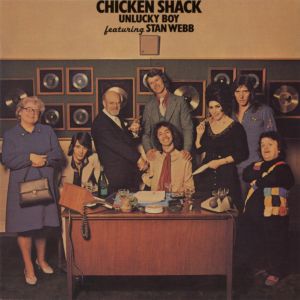
- Format: MP3

Japan 24-Bit Remaster
Originally released in 1973, but reissued with two extra tracks as part of Japan Blues Masters series in 2007, Chicken Shack's Unlucky Boy finds guitarist/vocalist/songwriter and band founder Stan Webb in fine form. Only drummer Paul Hancox remains from the uneven Imagination Lady, and indeed the horn-oriented approach here is much different than the plodding Led Zeppelin-isms of the previous disc. Webb contributes six originals, and even though they are derivative of Savoy Brown (a band he joined for the Boogie Brothers album just a year later), his approach here is much more subtle and controlled than on his last effort.
Chris Mercer's saxes, often double tracked to sound like a horn section, bring a tough R&B to the mix, and drummer Hancox is a controlled powerhouse. Webb also reigns in his impulse to overextend guitar solos so prevalent on Imagination Lady, whipping off tight, controlled leads instead. Producer Neil Slaven contributes honest, witty, and often self-deprecating liner notes that help explain why two of these songs suffer from poor mixes (basically, he had consumed various substances and couldn't salvage the songs after the fact). Strings on "As Time Goes Passing By," (also included in a shorter single version) are a nice touch and bring a bit of class to the proceedings while maintaining the R&B slant of the disc.
Two unedited studio jams make the cut as "Stan the Man" and the seven-minute "Jammin' with the Ash," both featuring pianist Tony Ashton, who really lets loose on the latter. Things get stripped down for an unusually delicate version of Lonnie Johnson's "Too Late to Cry" with just strummed guitar and bass. The opening trio of Webb-penned tunes shows some of his best songwriting with the instrumental "Prudence's Party" a terrific capsule of Webb's stinging, gritty guitar style. The album sounds dated but harkens back to a particular time in British blues that is charming in its anything goes attitude. That helps make this one of Stan Webb's more consistent and successful offerings.
The band was formed in 1967 and reputedly named themselves after the chicken coop in Kidderminster where they rehearsed; chicken shacks (chicken restaurants) had also by then frequently been mentioned in blues and rhythm and blues songs, as in Amos Milburn's hit, "Chicken Shack Boogie". Their first concert was at the 1967 National Blues and Jazz Festival at Windsor and they were signed by the Blue Horizon record label in the same year.
Chicken Shack enjoyed modest commercial success, with Christine Perfect being voted Best Female Vocalist in the Melody Maker polls, two years running.
Christine Perfect left the band in 1969 when she married John McVie of Fleetwood Mac. Pianist Paul Raymond, bassist Andy Sylvester, and drummer Dave Bidwell all left in 1971 to join Savoy Brown. Webb was also recruited for Savoy Brown in the mid 1970s, and recorded the album Boogie Brothers with them.
Although Chicken Shack went through several subsequent incarnations, it never equalled its earlier successes. However, Webb remains as its only constant band member.